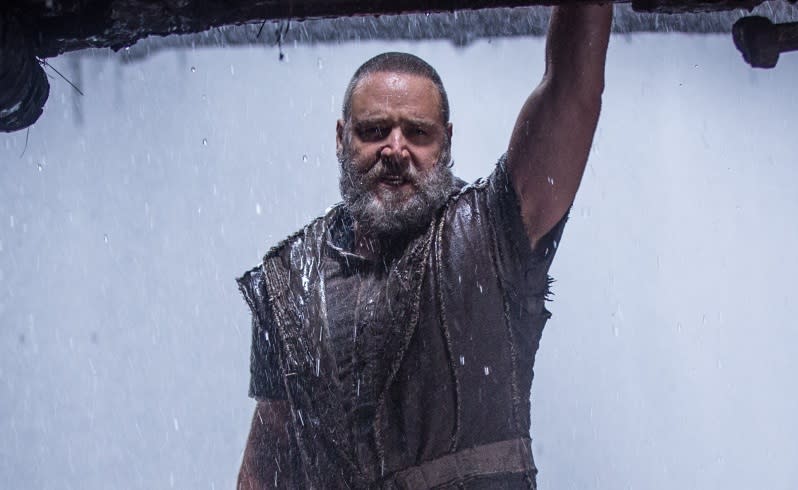Apocalypse Noah

After a long hiatus it was inevitable that Hollywood would return to the Bible as source material because of its centrality to our culture (there was The Passion of the Christ, but that was not a studio picture, rather a Mel Gibson passion project).
Of course, the Bible never left the cinematic consciousness - it is the core of every big-screen fantasy since Stars Wars, with plenty of references to the Old and New Testaments in Lord of the Rings, the Narnia movies and Harry Potter.
But who would have thought that of all the stories available to filmmakers it would be the tale of Noah that would spark renewed interest in the Bible?
Apart from its slightness - Mr Peabody could've delivered Noah a set of power tools and lectured Sherman about the flood all in the space of one of his Rocky and Bullwinkle segments - it is steeped in out-of-vogue Sunday school cheese and cheerfulness. Personally I would have started with a sexy new Samson and Delilah starring Chris Hemsworth and Scarlett Johansson.
But Darren Aronofsky has looked beyond the celestial blueprint for the ark, the cutesy two-by-two parade of animals and the fluffy white dove to give us a flood story for our pessimistic age, recasting it as a gloomy full-scale apocalyptic drama that should please fans of CGI-driven end-of-the-world spectacles and doomsday preppers alike.
While Aronofsky and his co-writer Ari Handel have embellished the story of Noah in ways that won't please those who believe the Bible was handed down by God and should not be tampered with, their interpretation feels more in keeping with the spirit of the Old Testament than any film I can remember.
And like a true auteur, Aronofsky has wrenched Noah into his cinematic universe, with Noah - played by Russell Crowe in his most commanding and assured performance in some time - joining the filmmaker's previous driven, obsessive heroes, such as Hugh Jackman's scientist seeking a cure for his wife's cancer in The Fountain and Natalie Portman's unhinged ballerina in Black Swan.
Aronofsky also pulls Noah into a more contemporary world by making him a proto-greenie, a vegetarian eking out a subsistence living on a blasted, desolate landscape that has been exploited and ruined by mankind since they were expelled from the Garden of Eden (he's one of the last descendants from the peaceful line of Seth).
Noah also has to protect his wife (Jennifer Connolly) and sons against meat-eating marauders descended from the line of Cain and headed by a warlord played by Ray Winstone, a lusty, live-for-the- moment type who believes the earth has been given to man to exploit and not to protect (he's Clive Palmer to Scott Ludlam's Noah).
When he receives his instructions to build an ark in preparation for a deluge that will wipe out all life on Earth (all conveyed through dreams and not Morgan Freeman-esque intoning) Noah gets cracking, aided by God and a band of fallen angels who have morphed into six-armed stone colossi.
Now the Bible does say "there were giants in those days" and this is a world of miracles. But Aronofsky, one of the great contemporary visual directors, could have opted for creatures that didn't evoke Michael Bay's Transformers and similar beings in Peter Jackson's Lord of the Rings and The Hobbit (they should elicit awe and wonder, not titters of recognition).
However, Aronofsky overcomes this misstep after the deluge arrives and Noah must fight off the sinful hordes desperate to get on to the ark, to batten down the hatches and make ready to reboot God's creation with the innocent, that is the animals, but not with mankind - including his own otherwise pure-living brood.
In the film's most fascinating twist, Noah concludes that the only way to carry out God's orders is to let his own lot die out, which means not letting his middle son Ham (Logan Lerman) take a wife, nor allow his oldest boy Shem (Douglas Booth) and his partner (Emma Watson) to make babies. They must be the end of the line.
This gripping, intellectually challenging middle and later portion of Aronofsky's movie morphs into an unsettling Shining-like horror story, with Noah instituting a reign of terror over his family and confronting Winstone's stowaway Tubal-Cain.
Unlike in the usual good-versus-evil clash of the average action-fantasy, Noah crosses the line and becomes a genocidal lunatic, while the corrupt, murderous Tubal-Cain makes the very reasonable argument on behalf of humanity, that people - those who Noah let drown - are more important than animals.
Thus inside this often unwieldy, faintly ridiculous Biblical epic is a riveting psychological and philosophical drama which plays out themes that have dogged Western culture since man put down the axe and the spear long enough to think.
Aronofsky's movie is a long way from perfect but if this is what contemporary filmmakers will do with the biblical epic I'm ready to follow, that's if Noah will let me aboard.


